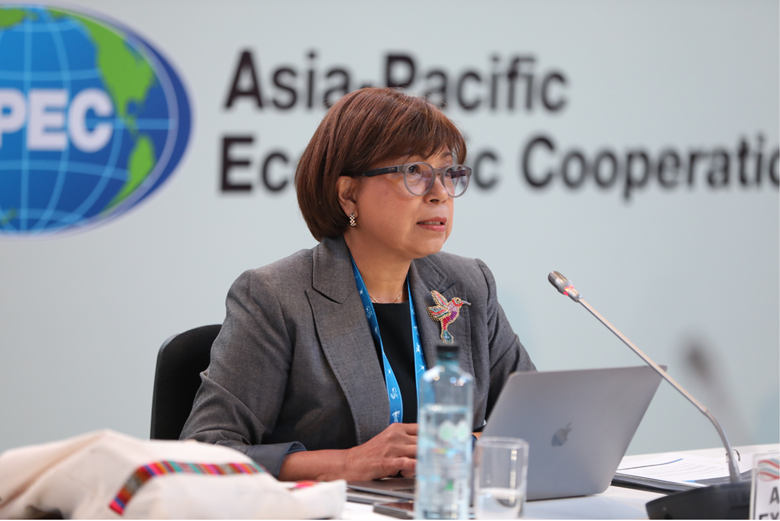The Value of APEC at a Time of Growing International Turmoil

As geopolitical tensions and concerns about the environment deepened, APEC’s 2023 agenda focused on fostering sustainable and inclusive development, highlighting its pivotal role as a forum for constructive discussion to promote international cooperation.
The question, however, was whether APEC, built on the voluntary commitment of Asia Pacific economies to cooperate in managing their large common ambitions for open, sustainable regional development, could straddle the political and other fissures that were dividing its members.
The fractious atmospherics surrounding the San Francisco summit underscored this question. Outside the Moscone Centre where the APEC Leaders’ Meeting was held, the loudest protest was that APEC was ‘doing nothing’ about the environment or for ordinary people; that APEC was only about ‘free trade and big business.’
In fact, in 2023, APEC did much to engage the interests of community stakeholders. Shepherded by the United States, APEC—which has long had a productive relationship with the region’s business community—stepped up its engagement with a wide cross-section of society. The APEC Multistakeholder Forum enabled members of the private sector, civil society, Indigenous peoples, youth, people with disabilities, academics and entrepreneurs to better promote sustainable and inclusive development. These candid conversations contributed to policy discussions about recovery and the sources of future growth.
The APEC 2023 agenda, summed up thematically as ‘Creating a Resilient and Sustainable Future for All’, saw the group advance ‘work on key issues such as supply chain resilience, digital trade, connectivity, opportunities for small and medium-sized enterprises, climate change and environmental sustainability’. Issues around ‘food security, health, anti-corruption, digitalization, women’s economic empowerment, and supporting historically underserved and underrepresented communities’ were also a focus of the discussion at last year’s meetings. In short, the agenda emphasized an APEC that is ‘interconnected, innovative and inclusive’.
The United States hosted the first APEC Leaders’ Meeting in 1993 to foster relationships among economies on both sides of the Pacific. In the 1990s, APEC officials focused on the goals of free and open trade and investment to realize growth. That summit significantly provided the first occasion after 1989 for a meeting between the US and Chinese presidents.
The last time the United States hosted APEC was in 2011. The United States’ hosting the 2023 APEC Economic Leaders’ Meeting could be seen as the its return to multilateralism, in a very different global landscape from that of just a few years ago.
In recent years, APEC has been tested like never before—with trade tensions, the COVID-19 pandemic and conflicts at flashpoints across the globe. No APEC member state is in direct conflict with another, but tensions elsewhere have stoked disagreements over human rights, peace and security—issues that do not usually fall directly on the forum’s agenda.
The United States tried to manage inevitable but important pronouncements on geopolitics, including its own objections and pronouncements, while ensuring the group stayed focused on APEC’s vision of sustainable and inclusive growth. Historical disagreements over issues less fraught have led to failure to reach consensus in the past. The signing of the Golden Gate Declaration by all 21 economies at the 2023 Meeting, along with separate chairs’ statements addressing conflicts, demonstrated that there was room for agreement and a spotlight on dealing with shared crises.
The environment, particularly climate change, was a issue that APEC officials from around the region were determined to take on together during the Leaders’ Meeting. As the host economy, the United States steered the process constructively. It launched initiatives including the Just Energy Transition Initiative, a commitment to developing future energy transition policies that advance wellbeing and environmental stewardship alongside economic growth.
The Just Energy Transition Initiative affirms the need to provide decent and environmentally responsible livelihoods during the shift to renewable energy. Leveraging its multisector reach, the forum brought in businesses to discussion of how it would commit to reducing the carbon footprint of industry.
Discussions among agriculture officials focused on food security through sustainable systems, with an emphasis on improving food security without harming the environment. For example, the Principles for Achieving Food Security Through Sustainable Agri-food Systems in the APEC Region, agreed upon by members, sets out principles in the development of food security related policy, practices and regulations.
APEC transport ministers focused on catalyzing the transition towards low and zero emission light-duty vehicles and electric vehicles. It also included the development of, and transition to, sustainable aviation fuels, a push towards low and zero emission maritime shipping and port decarbonization as avenues for the region’s energy transition.
Importantly, despite the geopolitical turmoil in 2023, APEC provided opportunity for US President Joe Biden and Chinese President Xi Jinping to coordinate a productive leader-level engagement on APEC’s margins.
Geopolitical issues will persist and may grow even more heated as the election seasons unfold through 2024. Yet, APEC’s agenda builds in an expectation of progress at its next summit Lima in 2024, when Peru hosts the grouping once more. APEC’s value has always been in the platform it provides to build trust and facilitate difficult conversations to make headway on matters of common importance. This is essential at a time when conflict and disagreement threaten to rip international cooperation apart.
***
Dr Rebecca Sta Maria is the executive director of the APEC Secretariat. This article was first published by the East Asia Forum on 8 March 2024.

